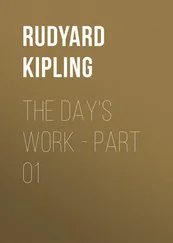Джозеф Киплинг - The Day's Work - Volume 1
Здесь есть возможность читать онлайн «Джозеф Киплинг - The Day's Work - Volume 1» весь текст электронной книги совершенно бесплатно (целиком полную версию без сокращений). В некоторых случаях можно слушать аудио, скачать через торрент в формате fb2 и присутствует краткое содержание. Год выпуска: 2014, Издательство: epubBooks Classics, Жанр: Прочие приключения, на английском языке. Описание произведения, (предисловие) а так же отзывы посетителей доступны на портале библиотеки ЛибКат.
- Название:The Day's Work - Volume 1
- Автор:
- Издательство:epubBooks Classics
- Жанр:
- Год:2014
- ISBN:нет данных
- Рейтинг книги:3 / 5. Голосов: 1
-
Избранное:Добавить в избранное
- Отзывы:
-
Ваша оценка:
- 60
- 1
- 2
- 3
- 4
- 5
The Day's Work - Volume 1: краткое содержание, описание и аннотация
Предлагаем к чтению аннотацию, описание, краткое содержание или предисловие (зависит от того, что написал сам автор книги «The Day's Work - Volume 1»). Если вы не нашли необходимую информацию о книге — напишите в комментариях, мы постараемся отыскать её.
The Day's Work - Volume 1 — читать онлайн бесплатно полную книгу (весь текст) целиком
Ниже представлен текст книги, разбитый по страницам. Система сохранения места последней прочитанной страницы, позволяет с удобством читать онлайн бесплатно книгу «The Day's Work - Volume 1», без необходимости каждый раз заново искать на чём Вы остановились. Поставьте закладку, и сможете в любой момент перейти на страницу, на которой закончили чтение.
Интервал:
Закладка:
The movements of the grown–ups, whom Georgie tolerated, but did not pretend to understand, removed his world, when he was seven years old, to a place called "Oxford–on–a–visit. "Here were huge buildings surrounded by vast prairies, with streets of infinite length, and, above all, something called the "buttery," which Georgie was dying to see, because he knew it must be greasy, and therefore delightful. He perceived how correct were his judgments when his nurse led him through a stone arch into the presence of an enormously fat man, who asked him if he would like some, bread and cheese. Georgie was used to eat all round the clock, so he took what "buttery" gave him, and would have taken some brown liquid called "auditale" but that his nurse led him away to an afternoon performance of a thing called "Pepper's Ghost." This was intensely thrilling. People's heads came off and flew all over the stage, and skeletons danced bone by bone, while Mr. Pepper himself, beyond question a man of the worst, waved his arms and flapped a long gown, and in a deep bass voice (Georgie had never heard a man sing before) told of his sorrows unspeakable. Some grown–up or other tried to explain that the illusion was made with mirrors, and that there was no need to be frightened. Georgie did not know what illusions were, but he did know that a mirror was the looking–glass with the ivory handle on his mother's dressing–table. Therefore the "grown–up" was "just saying things" after the distressing custom of "grown–ups," and Georgie cast about for amusement between scenes. Next to him sat a little girl dressed all in black, her hair combed off her forehead exactly like the girl in the book called "Alice in Wonderland," which had been given him on his last birthday. The little girl looked at Georgie, and Georgie looked at her. There seemed to be no need of any further introduction.
"I've got a cut on my thumb," said he. It was the first work of his first real knife, a savage triangular hack, and he esteemed it a most valuable possession.
"I'm tho thorry!" she lisped. "Let me look pleathe."
"There's a di–ack–lum plaster on, but it's all raw under," Georgie answered, complying.
"Dothent it hurt?"—her grey eyes were full of pity and interest.
"Awf'ly. Perhaps it will give me lockjaw."
"It lookth very horrid. I'm tho thorry!" She put a forefinger to his hand, and held her head sidewise for a better view.
Here the nurse turned, and shook him severely. "You mustn't talk to strange little girls, Master Georgie."
"She isn't strange. She's very nice. I like her, an' I've showed her my new cut."
"The idea! You change places with me."
She moved him over, and shut out the little girl from his view, while the grown–up behind renewed the futile explanations.
"I am not afraid, truly," said the boy, wriggling in despair; "but why don't you go to sleep in the afternoons, same as Provost of Oriel?"
Georgie had been introduced to a grown–up of that name, who slept in his presence without apology. Georgie understood that he was the most important grown–up in Oxford; hence he strove to gild his rebuke with flatteries. This grown–up did not seem to like it, but he collapsed, and Georgie lay back in his seat, silent and enraptured. Mr. Pepper was singing again, and the deep, ringing voice, the red fire, and the misty, waving gown all seemed to be mixed up with the little girl who had been so kind about his cut. When the performance was ended she nodded to Georgie, and Georgie nodded in return. He spoke no more than was necessary till bedtime, but meditated on new colors and sounds and lights and music and things as far as he understood them; the deep–mouthed agony of Mr. Pepper mingling with the little girl's lisp. That night he made a new tale, from which he shamelessly removed the Rapunzel–Rapunzel–let–down–your–hair princess, gold crown, Grimm edition, and all, and put a new Annieanlouise in her place. So it was perfectly right and natural that when he came to the brushwood–pile he should find her waiting for him, her hair combed off her forehead more like Alice in Wonderland than ever, and the races and adventures began.
Ten years at an English public school do not encourage dreaming. Georgie won his growth and chest measurement, and a few other things which did not appear in the bills, under a system of cricket, foot–ball, and paper–chases, from four to five days a week, which provided for three lawful cuts of a ground–ash if any boy absented himself from these entertainments. He became a rumple–collared, dusty–hatted fag of the Lower Third, and a light half–back at Little Side foot–ball; was pushed and prodded through the slack backwaters of the Lower Fourth, where the raffle of a school generally accumulates; won his "second–fifteen" cap at foot–ball, enjoyed the dignity of a study with two companions in it, and began to look forward to office as a sub–prefect. At last he blossomed into full glory as head of the school, ex–officio captain of the games; head of his house, where he and his lieutenants preserved discipline and decency among seventy boys from twelve to seventeen; general arbiter in the quarrels that spring up among the touchy Sixth—and intimate friend and ally of the Head himself. When he stepped forth in the black jersey, white knickers, and black stockings of the First Fifteen, the new match–ball under his arm, and his old and frayed cap at the back of his head, the small fry of the lower forms stood apart and worshipped, and the "new caps" of the team talked to him ostentatiously, that the world might see. And so, in summer, when he came back to the pavilion after a slow but eminently safe game, it mattered not whether he had made nothing or, as once happened, a hundred and three, the school shouted just the same, and women–folk who had come to look at the match looked at Cottar—Cottar, major; "that's Cottar!" Above all, he was responsible for that thing called the tone of the school, and few realise with what passionate devotion a certain type of boy throws himself into this work. Home was a faraway country, full of ponies and fishing and shooting, and men–visitors who interfered with one's plans; but school was the real world, where things of vital importance happened, and crises arose that must be dealt with promptly and quietly. Not for nothing was it written, "Let the Consuls look to it that the Republic takes no harm," and Georgie was glad to be back in authority when the holidays ended. Behind him, but not too near, was the wise and temperate Head, now suggesting the wisdom of the serpent, now counselling the mildness of the dove; leading him on to see, more by half–hints than by any direct word, how boys and men are all of a piece, and how he who can handle the one will assuredly in time control the other.
For the rest, the school was not encouraged to dwell on its emotions, but rather to keep in hard condition, to avoid false quantities, and to enter the army direct, without the help of the expensive London crammer, under whose roof young blood learns too much. Cottar, major, went the way of hundreds before him. The Head gave him six months' final polish, taught him what kind of answers best please a certain kind of examiners, and handed him over to the properly constituted authorities, who passed him into Sandhurst. Here he had sense enough to see that he was in the Lower Third once more, and behaved with respect toward his seniors, till they in turn respected him, and he was promoted to the rank of corporal, and sat in authority over mixed peoples with all the vices of men and boys combined. His reward was another string of athletic cups, a good–conduct sword, and, at last, Her Majesty's commission as a subaltern in a first–class line regiment. He did not know that he bore with him from school and college a character worth much fine gold, but was pleased to find his mess so kindly. He had plenty of money of his own; his training had set the public school mask upon his face, and had taught him how many were the "things no fellow can do." By virtue of the same training he kept his pores open and his mouth shut.
Читать дальшеИнтервал:
Закладка:
Похожие книги на «The Day's Work - Volume 1»
Представляем Вашему вниманию похожие книги на «The Day's Work - Volume 1» списком для выбора. Мы отобрали схожую по названию и смыслу литературу в надежде предоставить читателям больше вариантов отыскать новые, интересные, ещё непрочитанные произведения.
Обсуждение, отзывы о книге «The Day's Work - Volume 1» и просто собственные мнения читателей. Оставьте ваши комментарии, напишите, что Вы думаете о произведении, его смысле или главных героях. Укажите что конкретно понравилось, а что нет, и почему Вы так считаете.












